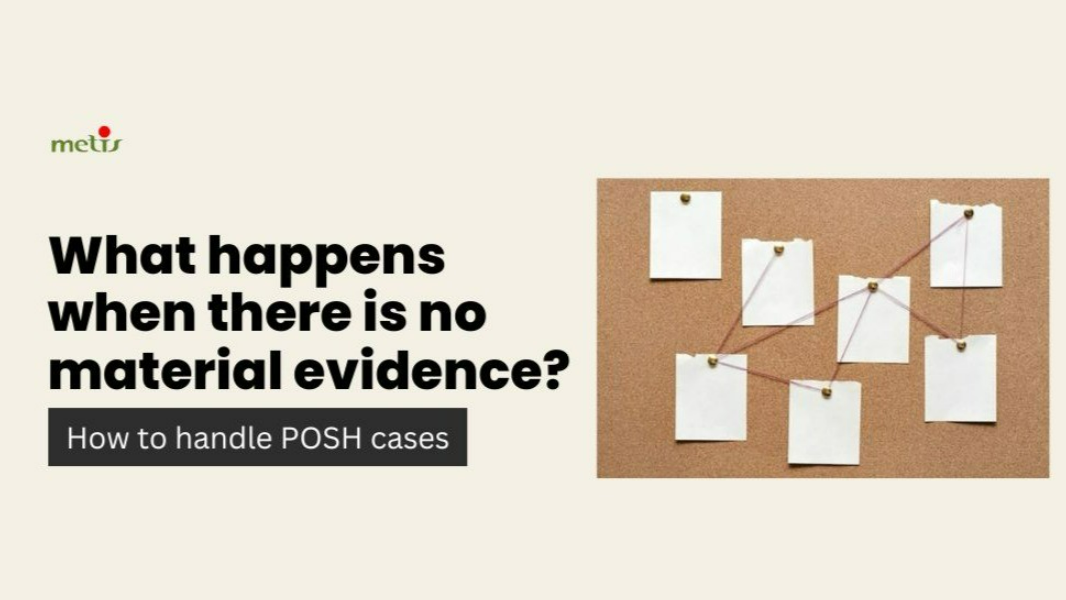When you’re serving on an Internal Committee and a complaint lands before you with no material evidence, such as emails, CCTV footage, or clear witness statements, it can feel like you’ve entered a maze. But it’s not a dead end. A measured and fair investigation process can still lead to a defensible and just outcome.
What “no material evidence” means
Material evidence means something tangible that supports or refutes the allegation: a recording, a document, or a witness who saw the act. If you have none of that, it means you must base your review on what is available: statements, context, circumstances, behaviour, and reliability. Sexual harassment cases and other workplace complaints often face this challenge, as many incidents occur in private and lack independent documentation
Starting with transparency
When you begin the enquiry, note what evidence was sought and what was not found. For example: “No CCTV footage exists of the relevant location on the date in question,” or “No independent witness presented who saw the interaction.” This is not a finding of guilt or innocence; it simply documents what the Committee has already done. That clarity builds trust in the process.
Looking beyond the “documented proof”
In the absence of direct proof, focus on relevant facts and circumstantial indicators. These might include behavioural patterns (has the respondent faced similar complaints?), digital traces (access logs, timestamps), and changes in the complainant’s behaviour. These don’t guarantee the finding, but they allow your Committee to make informed observations.
The role of fairness in your inquiry
Fairness remains the bedrock. Even without strong evidence, you must treat both parties with respect. Offer the complainant and respondent equal opportunity to present their account. Ask honest questions, not leading ones. Your Committee’s neutrality should be clear in how you conduct the enquiry and record its progress. A well-documented, impartial process is critical.
Evaluating what you can conclude
Here, a key principle comes into play — the preponderance of probability. This principle means you are not seeking proof “beyond a reasonable doubt” as done in criminal courts, but rather asking: Is it more likely that the alleged event occurred? If the available information slightly favours the complainant, you can find the allegation proved. If things are evenly balanced, you must say the allegation is not proved. This is because civil investigations function on this standard of “just over 50%” rather than absolute certainty.
Communicating the outcome
How you frame the conclusion is important. Inform both parties privately, use clear and respectful language, and avoid implying blame. For the complainant, emphasise that a finding of “not proved” is not the same as a conclusion of “false”. For the respondent, maintain the presumption of fairness. Remind both parties of confidentiality obligations and protections against retaliation.
Why every such case matters
Even when you don’t find material evidence, the enquiry has value. You demonstrate that the organisation takes complaints seriously, conducts fair reviews, and learns from what happened. The absence of evidence might signal deeper gaps — say, in how behaviours are documented or how records are maintained. As a result, your Internal Committee can recommend improvements to policy, training, record-keeping or supervision.
POSH case without material evidence is still valid
Managing a case without material evidence takes care, discipline and empathy. Your role as an IC member is to ensure the process is fair, transparent, and reasoned — and to base your outcome on whether it is more likely than not that the incident occurred. The principle of the preponderance of probabilities gives you the framework; your careful inquiry gives the process legitimacy. In doing so, you help your organisation reinforce what truly matters: respectful, safe workplaces where allegations are heard, considered and acted upon with integrity.
POSH Cases and the Indian Evidence Act
While inquiries under the POSH Act, 2013, do not fall under the Indian Evidence Act, 1872, the principles of natural justice and reasoned decision-making still apply. The Internal Committee (IC) is not bound by the strict technical rules of evidence that apply in a court of law. However, given that the POSH Act confers certain powers of a civil court on the Committee, such as summoning witnesses, requiring document production, and examining evidence on oath, the quality and reliability of evidence considered should be such that it would be acceptable and defensible in a court of law if ever challenged.
In practice, this means that while the IC can adopt a flexible, inquiry-based approach, it must still rely on credible, relevant, and verifiable material when forming conclusions. The focus should be on ensuring procedural fairness, transparency, and documentation so that the Committee’s findings stand up to judicial or appellate scrutiny if required.
Reach out to us to train your IC on handling different POSH case scenarios: contact@posh.metisindia.com

